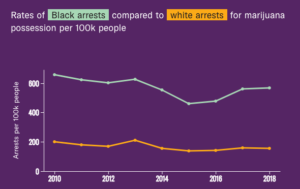April 21, 2020
 African-Americans are nearly four-times as likely as whites to be arrested in the United States for marijuana-possession offenses, according to an analysis published Monday by the American Civil Liberties Union (ACLU).
African-Americans are nearly four-times as likely as whites to be arrested in the United States for marijuana-possession offenses, according to an analysis published Monday by the American Civil Liberties Union (ACLU).
According to the ACLU’s report, Blacks are 3.64 times more likely than whites to face arrest, despite both groups acknowledging consuming cannabis at nearly similar rates.
Authors wrote, “In every single state, Black people were more likely to be arrested for marijuana possession, and in some states, Black people were up to six, eight, or almost ten times more likely to be arrested. In 31 states, racial disparities were actually larger in 2018 than they were in 2010.”
In two states, Montana and Kentucky, African Americans were arrested for marijuana possession violations at more than nine times the rate of Caucasians – the highest disparity in the country. Colorado and Alaska, which legalized adult-use marijuana sales in 2012 and 2014 respectively, had the lowest disparities in unlawful marijuana possession arrest rates.
“While we are pleased to see the overall number of possession arrests dramatically decline in legal states, the persistent racial disparity among those who are arrested for violating marijuana laws speaks to a larger underlying problem with the way in which law enforcement often interacts with citizens, particularly communities of color,” said NORML’s Political Director Justin Strekal.
Authors reported that per capita marijuana possession arrests rose from 2010 to 2018 in states where possession offenses remain criminalized. By contrast, marijuana possession arrests fell significantly in jurisdictions that decriminalized cannabis offenses, and fell even more so in states that had legalized it.
Nonetheless, even in these latter jurisdictions, racial disparities still existed among those arrested for marijuana crimes. However, the ACLU acknowledged, “On average, states that have legalized marijuana possession had lower racial disparities in possession arrests in 2018 compared both to states that have only decriminalized and states where marijuana remains illegal.”
Strekal added, “The legalization of marijuana is not a panacea to solve the structural problems of systemic racism that persist in America. Nevertheless, legalizing and regulating cannabis reduces the total volume of marijuana arrests as well as one of the primary reasons for police interactions with the public — interactions that have been historically abused by police against people of color.”
The full text of the study, “A Tale of Two Countries: Racially Targeted Arrests in the Era of Marijuana Reform,” is online here. Additional information is available from the NORML fact-sheet, ‘Racial Disparity in Marijuana Arrests.’










